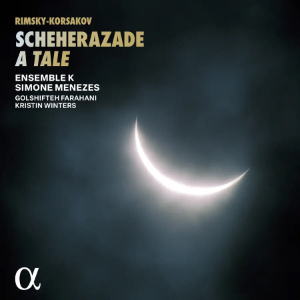
Nikolai Rimsky-Korsakov (1844-1908)
Scheherazade, A Tale
Music transcribed under the auspices of Vincent Paulet
Text by Simon Scardifield, Lynn Serfaty and Simone Menezes
Golshifteh Farahani and Kristin Winters (narrators)
Ensemble K/Simone Menezes
rec. 2023, Salle Colonne, Paris, France
Alpha Classics 1081 [2 CDs: 94]
As you might guess from the title, this isn’t Scheherazade as you already know it, and you might well argue that anyone bold enough to rearrange Rimsky Korsakov’s music, one of the brightest orchestral collages in the musical kaleidoscope, is bold to the point of foolhardiness.
However, Scheherazade, A Tale is more than just a rearrangement: in fact, it’s a reimagining of Scheherazade to rethink it in the context of its Arabian Nights heritage. Not only does this disc give you Rimsky Korsakov’s music rearranged “under the auspices of Vincent Paulet” in a chamber orchestration for Ensemble K, but you get a story written by Simon Scardifield, Lynn Serfaty and Simone Menezes, and spoken evocatively by Golshifteh Farahani and Kristin Winters. The text is based loosely around some convincing enough Arabian Nights mythology, with a peppering of girl-power feminism which I suppose is meant to give it more punch for our time. The CD booklet gives you the full text which you can read at your own pace and, in truth, it doesn’t look like much when you see it on the page. However, it becomes mysteriously evocative when you hear it amidst the music, and the pungent accents of the two narrators give it a wisp of magic that you wouldn’t expect when you just read it. Just in case, however, there are two discs in the package, one of them giving you the music with the narration and one with the music uninterrupted on its own, so you can decide which way you’d rather take it.
And what of that arrangement? It’s actually remarkably effective. It doesn’t try to rethink Rimsky’s score unduly, rather it concentrates and focuses it so that I was surprised by how convincingly I was taken in by it. The first thing you notice is the power of the Sultan’s theme, which loses remarkably little weight in this rendering, and the heft and heave of the waves supporting Sinbad’s ship are marvellously persuasive, despite using only fourteen musicians. There are also obvious gains in transparency, which you notice a lot in the prickly meanderings of the Kalendar Prince, where the solo instruments all sound great (there’s no hiding place in an orchestra of this size.
The love scene of the third movement opens with solo strings, and it’s true that you don’t get that irresistible swoop in the opening bars that brings such heady bliss in the full orchestral arrangement. Again, however, it’s completely persuasive and I found myself melting amidst the heady strings and gurgling wind punctuation. The playful central section sounds even more perky when played by chamber forces, and the hubbub of the finale has proper edge and point, perhaps even more so than in the sweep of a full orchestra. Only in the great rush of the end, where (originally) the festival of Baghdad gives way to the shipwreck, would I have wanted greater power and heft: it’s one of the greatest jump-cuts in music and needs all the cinematic heft it can get. In every other sense, however, this arrangement is a winner, and comes into its own again for the poignant final moments where Scheherazade wins and the Sultan is pacified, an effect which is rendered magically here.
All of the instrumentalists in Ensemble K acquit themselves with remarkable flair, and conductor Simone Menezes, who also collaborated in writing the text, shapes the whole thing with clarity and vision. Definitely a disc for the Rimsky curious.
Simon Thompson
Buying this recording via a link below generates revenue for MWI, which helps the site remain free

















